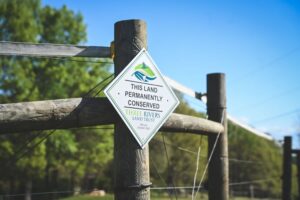
by Crystal Cockman
April 18, 2018
 “There are two spiritual dangers in not owning a farm. One is the danger of supposing that breakfast comes from the grocery, and the other that heat comes from the furnace.” – Aldo Leopold
“There are two spiritual dangers in not owning a farm. One is the danger of supposing that breakfast comes from the grocery, and the other that heat comes from the furnace.” – Aldo Leopold
I grew up on a small farm, with chickens and cows, and my grandpa also had goats, so I knew in a sense that food comes from these animals. Many children today are so disconnected from the land that they think chocolate milk comes from a brown cow. Many of us grew up with vegetable gardens, sharing produce with family and friends, picking apples off a tree, or collecting eggs from a henhouse.
Later in life, I took up the sport of hunting, and the realization of where food comes from becomes even more real when you have to take the life of the animal that provides it.
Children these days don’t often have those experiences and are much more likely to think that their food just comes from the grocery store. With this disconnect from harvesting our own food or obtaining it from local farms, children are also less likely now to eat healthy foods.
The loss of small farms as they lose out to development, and the aging of the farmer population will soon leave us with a diminishing supply of good food if we don’t make sure that farmers have the markets and resources they need. Taking children to local farmers markets and supporting local farms, helps ensure that these farms will be around for future generations. The LandTrust for Central NC works with local farmers to conserve their farms, ensuring that development will never take them over.
The number of hunters is also declining, as well as the amount of green space available on which to hunt. At The LandTrust for Central NC, we not only protect these wild spaces, but we also take kids out on youth hunts, so they can learn that in order to have meat to eat, some living creature must give up its life. But being a conservation-minded and ethical sportsman isn’t only about the harvesting of game, but is the development of an appreciation for the wildlife and wild places that provide this opportunity.
We live in a time when children can name more Pokémon characters than wildlife species. At The LandTrust for Central NC, we believe that a love for nature is often cultivated through exposure. Providing children with experiences in the outdoors helps ensure they will become the next generation of conservationists. Without a connection to nature, people lose interest in protecting it.
Local food, clean water, clean air, places to recreate, and preservation of history are all benefits of land conservation. If we don’t instill the importance of these benefits in children today, what will tomorrow look like?